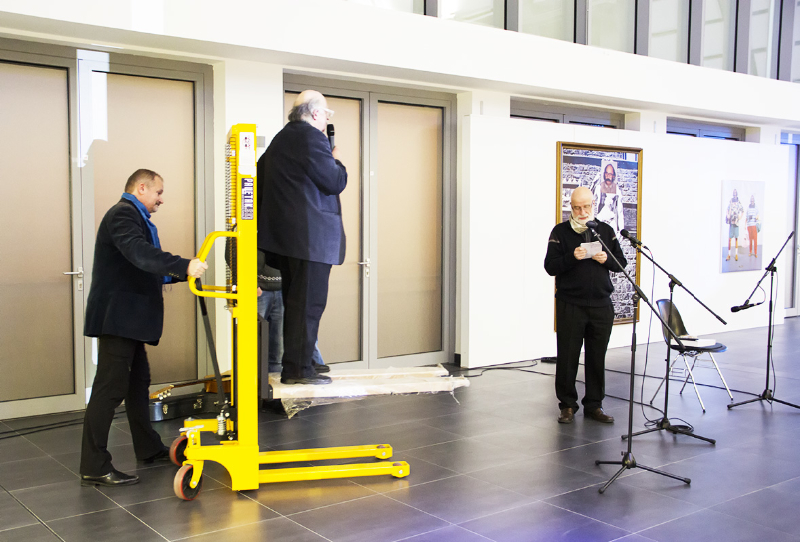
A CASE HISTORY OF A SOCIETY
 Following the last year’s success of Anamnesis by Viktor Bodó, his student director Dániel D. Kovács is coming to put questions about the mental health of society. The ensemble Sputnik is back at Divadelná Nitra. Once again with a good portion of humour and absurdity, this time in the project Parallel Lives on the topic of secret police actives during the communist regime. Or not only then?
Following the last year’s success of Anamnesis by Viktor Bodó, his student director Dániel D. Kovács is coming to put questions about the mental health of society. The ensemble Sputnik is back at Divadelná Nitra. Once again with a good portion of humour and absurdity, this time in the project Parallel Lives on the topic of secret police actives during the communist regime. Or not only then?
–––––––––––––––––––
Is there an objective truth in connection with issues related to the past? Has the state system power to determine who is mentally sound and who is not? How does the state power control its citizens and why is it doing it? These are just a few questions put by the Hungarian team of the project Parallel Lives in their production of Meltdown. Although the story of a psychiatrist pursued by the communist regime is focal, the questions put by the authors are highly topical.
For the young authors Dániel D. Kovács and Péter Závada topicality is an important part of the whole story – in order to better understand the present, we have to study the past. It is one of the premises that were at the beginning of their work for the project Parallel Lives. Their production is literally about a parallel life. Life of a certain psychiatrist, which has been torn to pieces by the communist power.
 The main subject of the story captures the fate of R. Z., a psychiatrist who ends up as a patient in the hospital for the mentally disturbed. She is diagnosed as a schizophrenic, but she claims that the state security has conspired against her to eliminate her. Therefore she starts writing reports about her “gaolers”, while the doctors on duty write reports about her. An almost kafkaesque, dreadful story has the ambition to show the machinery and the terror of the communist regime which has many innocent victims on its records. However, the young Hungarian authors are not moralising. On the contrary, they are pointing out the incongruity and ambiguity of the whole story by applying irony and overview, which is so typical of them and suits the grotesque.
The main subject of the story captures the fate of R. Z., a psychiatrist who ends up as a patient in the hospital for the mentally disturbed. She is diagnosed as a schizophrenic, but she claims that the state security has conspired against her to eliminate her. Therefore she starts writing reports about her “gaolers”, while the doctors on duty write reports about her. An almost kafkaesque, dreadful story has the ambition to show the machinery and the terror of the communist regime which has many innocent victims on its records. However, the young Hungarian authors are not moralising. On the contrary, they are pointing out the incongruity and ambiguity of the whole story by applying irony and overview, which is so typical of them and suits the grotesque.
Is the psychiatrist R. Z. really ill? Or is she just thought to be ill by the state power, because it is playing its own game and needs to get rid of a cumbersome person? And although we never learn the real truth about R. Z., what is important is the fact that the production provides a metaphor of power functioning towards an individual, power which creates mechanisms to control the thinking and the conduct of an individual. And it was not only this Foucault idea that has attracted the Hungarian authors, but also the study of the discursive practice of the period, i.e., what were the ideological structures of the period which „enabled“ such tragic human stories and what it means for today.
 Dániel D. Kovács belongs to the youngest generation of Hungarian directors which continues in the footsteps of their slightly older and more famous colleagues, such as Viktor Bodó and Kornél Mundruczó. Together with their peer, poet and author Péter Závada, they are a promise for an independent, ideologically and formally provocative theatre. It is an asset to the project Parallel Lives that young authors make statements about the recent past and the communist regime, although they themselves have had no direct experience of it. The more interesting it is to watch what view of their country’s past they present to us.
Dániel D. Kovács belongs to the youngest generation of Hungarian directors which continues in the footsteps of their slightly older and more famous colleagues, such as Viktor Bodó and Kornél Mundruczó. Together with their peer, poet and author Péter Závada, they are a promise for an independent, ideologically and formally provocative theatre. It is an asset to the project Parallel Lives that young authors make statements about the recent past and the communist regime, although they themselves have had no direct experience of it. The more interesting it is to watch what view of their country’s past they present to us.
The origin of the production was initiated by the Divadelná Nitra Association within the project Parallel Lives – 20th Century through the Eyes of the Secret Police.
Hungarian premiere: 28 September 2013
Place: Kasárne/Kulturpark
21. november, 2013
19:00
